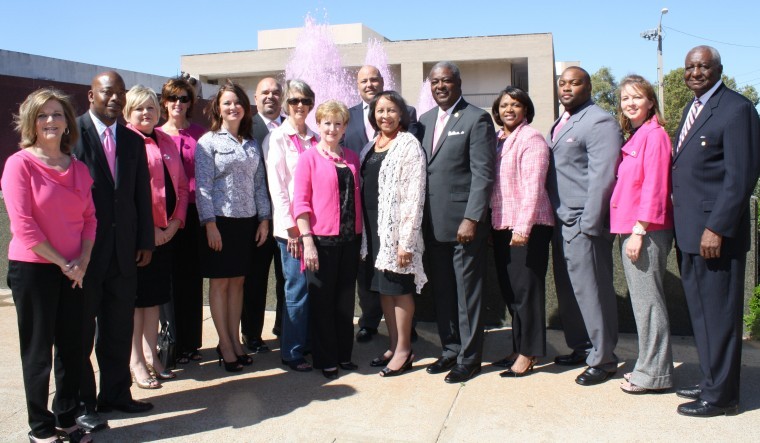Jackson native Wilma Mosley Clopton, Ph.D., had waged war against breast cancer long before she had any inkling that she would be impacted by the disease.
“It’s just something I stumbled upon doing years and years ago,” Clopton said. “I began my interest in fighting breast cancer in the mid 1990’s. At that time, I was a wholesale food distributor and living in St. Louis, Mo. I became active in a number of health initiatives across the state and was on the board of the Minority Health Affiliate, both at the local and state level.”
A factor that further stirred her interest was learning that African American women were dying from breast cancer at a higher rate than any other race.
“One of the reasons they [researchers] said, was because African American women lacked access to fresh fruits and vegetables,” recalled Clopton. She began to do her own research and created a special program in local churches where people could have access to the foods they needed.
She organized a program called Baseline which launched an activity to encourage African American women to get their – what doctors called at that time – baseline mammogram. That is the point where one first gets the mammogram at age 40, and then use that base as a comparison for future tests. She later helped to establish the African American Breast Cancer Network. She said the women were so excited about becoming involved in the fight and in networking with each other.
She found herself so entrenched in breast cancer awareness and in the fight that, at one point, she had to stop and ask herself: “Why am I so involved in getting this network together?”
Then, the answer came. “In 1998, I was diagnosed with breast cancer,” Clopton said. “I said oh, okay God, now I understand why. You were getting me prepared so I would know which way to go and how to deal with it. That was my very first reaction.”
Clopton told The Mississippi Link that she found her own lump. “I felt a very large lump under my right arm one night while lying in bed. I had it checked out, and they told me it was a very aggressive form of breast cancer. It had already gone to my lymph nodes,” she said.
Lymph nodes, sometimes referred to as lymph glands, are small rounded or bean-shaped masses of lymphatic tissue surrounded by a capsule of connective tissue.
Clopton said eleven of her lymph nodes were impacted by the cancer.
She also said because God had prepared her and because of her strong faith in Him, she really did not break down initially. She remembers calling her friend Etheldra Jones and saying, “You won’t believe it; I’ve got breast cancer. This is a wonderful opportunity for us to talk about making a film and getting people involved in knowing what’s happening.”
The Mississippi Link talked with Jones via telephone in St. Louis. She attested to how well Clopton took the news of her diagnosis. “She never stopped smiling. She never seemed ashamed to tell people what was going on,” said Jones. “During the treatment, she lost her hair so she cut it into a cute style. She basically multiplied herself to help others to become survivors. She even fought with doctors to get funding to help African American Women.”
“The support of family and friends, when going through such a situation, Clopton said, is extremely important.
Clopton pointed out that she was getting her mammograms every year. Between the span of two mammograms she found she was already in stage two. There are four stages of breast cancer and they are based on the size of the tumor. (See the adjacent diagram.)
“So I had a modified radical mastectomy. I had a very wonderful oncologist. I had chemotherapy for six months.
The only time I actually fell apart was when I was walking down the hall to get my first chemo. That was when I went, ‘Ah man, this is really for real.’
That chapter of Clopton’s life may be history, but her personal war against the disease today still rages.
She is the president of the Steele Magnolia affliate of the Susan G. Komen for the Cure. The affliate covers a 30-county area of Mississippi. It provides grants to non-profits and churches in those areas that need help screening and educating the public about breast cancer.
She applauds the Susan G. Komen Foundation for its hefty fight against breast cancer. It has given more than $90 million to breast cancer research.
Clopton and the Steele Magnolia affiliate of Susan G. Komen, in conjunction with Mayor Harvey Johnson Jr. and his fellow Pink Tie Guys (a support group in the fight against breast cancer), recently turned the water pink in the public fountain in front of Thalia Mara Hall. The water will remain pink for the remainder of Breast Cancer Awareness Month.
She also urges everyone to attend the Pink Tie Gala, Oct. 21, 6 p.m., at the Marriott Hotel Downtown Jackson. “I’m just so excited about the gala because it’s a chance to really honor and recognize those people who are making a difference as survivors, volunteers and community activists who are doing things and truly committed to making this ‘hideous’ disease go away.
The band Southern Frye, led by David Parrish, is donating their services to the gala. Clopton said Parrish’s sister died of breast cancer and the fight is extremely important to him.”
Her words of encouragement are “don’t give up; don’t give in. The diagnosis is just the beginning. You determine how your life is from there.”
For more information about the Pink Tie Gala call 601-932-3999.



Be the first to comment